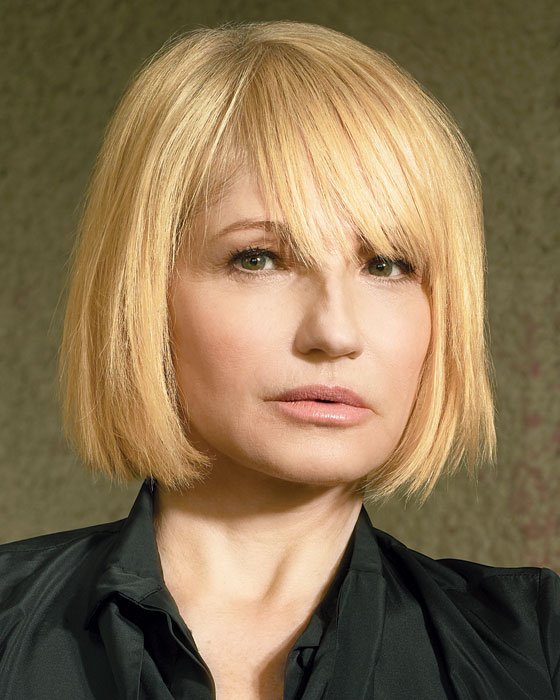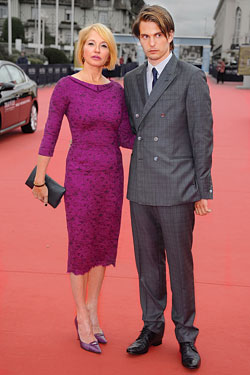
The first line of Ellen Barkin’s new film, Another Happy Day, is “Do you think Mom is hot?” She plays said mom; the question is raised by her character’s Asperger’s-afflicted youngest son to his teenage brother. It’s also the line that sold her on doing the movie.
“I said, ‘Wow, this is going to be really good,’ ” Barkin says, cackling loudly at our table overlooking the dining room of the Lion on West 9th Street. “Clearly there’s going to be a difference of opinion here, and one opinion is completely crazy! I said, ‘You know, I’m in.’ ”
She both stars in and produced the movie, by first-time writer-director Sam Levinson, who’s 26. They met three and a half years ago while working on Operation: Endgame, a nearly straight-to-video ensemble comedy starring Zach Galifianakis and Rob Corddry, about a bunch of government operatives stuck in a bunker trying to kill each other. Levinson had done a “brilliant” rewrite on it, despite the “really stupid premise.” It wasn’t until well into the shoot that she realized he had the same last name as Barry Levinson, who had given Barkin her first big role, in Diner in 1982 (it was the first film he’d both written and directed). She asked Sam, “Are you Barry’s kid?”
He was, and he asked her if she’d take a look at the script for Another Happy Day, adark comedy about family revelations, set at a wedding. “Ordinary People with belly laughs” is how she describes it. She loved that Levinson had written something “so perverse” at his mother’s kitchen table. “I’ve always said that any man who loves his mother loves women; that’s who your boyfriend should be and that’s who your husband should be,” says Barkin. It was the film’s sympathetic take on faltering mothers that gave her a “visceral” need to be a part of it.
Barkin’s big-gun agents, Bryan Lourd and Kevin Huvane at CAA, encouraged her not only to act in the film but to produce it, to better “protect this genius’s vision,” she says. “I don’t think I’ve ever said this in my life about anything—and it’s a word that I hate—but I am extremely proud of myself, and I’m proud of this film. It’s my greatest achievement, as an actor and certainly as a producer. I’m prouder of this than anything I’ve done.”
At 57, Barkin is having a very good year. She won a Tony for playing the impassioned, implacable wheelchair-bound early AIDS activist Dr. Emma Brookner in the revival of Larry Kramer’s playThe Normal Heart. She released a super-low-budget black-and-white film called Shit Year, about “a movie star who is retiring solely due to aging out of the business and a lack of work and proceeds to have a very subtle and serious and beautiful breakdown.” It was not based on personal experience, she says. “I feel that I’m doing better now as an actor than I ever did. I think my work is better, I think the kind of roles I’m getting offered are better.”
She looks incredible, her skin smooth and glowing. As she rushed up the stairs to the table, barely late, whole sections of her meticulously dyed blonde bob spiked straight up at different angles, as if she’d just been roused from something mind-blowing (she was really just at a fitting). She weaves long, entertaining yarns slowly and nasally through a crooked grin, with a look and tone of eternal amusement. She grew up in the South Bronx and Queens. (She tried, fifteen years ago, to revisit the Queens apartment, but “from the smell of it, it was clearly a crack house, so, no, I don’t go back.”) When the waiter mentions the truffle special, she interrupts him to guess the price: “Eight thousand dollars. For a shred.” It’s actually $75, “shaved quite liberally,” he replies. Barkin passes and orders chicken potpie. Throughout dinner, she keeps the Champagne coming, eyeing the waiter each time he approaches as if he ought to know better than to ask if she wants a refill: “Yes. Please. Thank you.”
She lives not far from the restaurant, and well: Her second husband, the billionaire Ron Perelman, reportedly settled with her for at least $20 million, and she won $4.3 million in a suit over a short-lived production company, Applehead, that he’d promised to invest in. (The story—which she won’t confirm—goes that he’d discouraged her from acting while they were married.) She also made $20 million in an auctionof the jewelry Perelman had given her. When I ask if the auction was a public “fuck you,” she replies, “No, it was a very practical matter. I’m basically … I’m under legal constraints not to discuss … but, no. I say ‘Fuck you’ in a much more direct way than that, quite frankly. I do it right up close and personal.”

Producing, she says, is a chance to use another part of her brain. “I wanted to learn a new job. I’ve been doing this for 30 years, and I’m excited to learn something else. Also, I’m very well suited for it.” As her former producing partner at Applehead told her, “Perfect job for you. You love telling people what to do, and you always think you’re right, even when you’re wrong. And you’re really tenacious.”
That tenacity has been on full display ever since Barkin got involved with Another Happy Day. At the Sundance Film Festival, where the movie premiered and Levinson won the Waldo Salt Screenwriting Award, Barkin could be seen mixing with the other indie producers, standing out in her fancy fur coat. Trying to drum up interest in the movie, she’d hand out her cell-phone number to anyone who asked. Even now, she’ll tote the film poster around to events to be photographed in front of it. She talks about the movie constantly on her entertainingly profane Twitter feed.
In the film, Barkin plays Lynn, a smothering, overwrought mother trying to do what she thinks is the right thing. She’s taking her younger sons, Ben (Daniel Yelsky), the one who thinks his mom is hot, and Elliot (Ezra Miller), a teen existentialist with drug problems, to the wedding of her well-adjusted eldest son, Dylan (Michael Nardelli), who was raised by his dad (Thomas Haden Church) and stepmom (Demi Moore). Also present: Lynn’s pretty daughter (Kate Bosworth), a self-mutilator; her aloof mother (Ellen Burstyn, with Oscar-worthy Barbara Bush hair); her doddering father (George Kennedy); and her gossiping sister (Siobhan Fallon).
To Barkin, the movie is about “how do we keep loving the people we love in the face of what seem like just downright bad decisions? How do you remember where your mother starts from and not judge her solely by her actions, however damaging they may or may not be? I think it’s a multigenerational story, because, as off-putting as Lynn can be, if you understand her mother, you understand her.” Barkin thinks that Hollywood tends to shy away from portrayals of terrible mothers, or at least “true and honest mothers, a mother like 99.9 percent of the mothers I know,” she says. “If you’re a mother, inherent in that job is that you’re going to make mistakes, and some of them are going to be very big and resonate with your children into adulthood.”
Barkin has two kids, a son, Jack, 22, a blues guitarist, and a daughter, Romy, 19, a student, both with her first husband, actor Gabriel Byrne, with whom she’s still friendly. In Barkin’s experience, she says, “mothers fuck up in very profound ways over the tiniest things. If you force your child to take piano lessons, you fucked up and they’re 7. If you didn’t force them, you fucked up because you let them stop. And I knew [this movie] would be excruciating for me because I made some really big mistakes, and now my children are at the age where the idea of starting to think about how seriously my mistakes, big and small, will resonate with them as adults—that’s some heavy shit.”
Barkin sees Lynn, who cries alot, as a woman who feels like “no one hears her and no one has ever heard her,” so she’s at this point just screaming. “It’s a constant vomiting out of very high-pitched, unfiltered emotion.” Going through that every day of the five-week shoot, says Barkin, “was excruciating, I’ll be honest with you. It was relentless.” Amid the tears, “There was one point when I looked at Ellen [Burstyn] and I said, ‘Okay, it’s enough already. I have to stop. First of all, I’ll lose the sympathy of the audience. Second of all, I just have to play another note.’ ” Burstyn assured Barkin that she was playing plenty of notes.
After the shoot, she found out at a post-screening Q&A that Levinson had envisioned Lynn as “very undemonstrative and very cold and remote and unemotional,” says Barkin. “I was kind of floored, because that never kind of crossed my mind reading the script.”
You’d think they’d know each other better: After all, she and the young Levinson, who is as awkward and handsome in person as the character Elliot in the film, have been reported to be romantically involved. Not that she’ll confirm or deny. “I won’t talk about anything in my personal life,” she says. “I’m a mother, I have children, I’ve been married and divorced two times. What is the most honest thing I can say—I’m not being coy—is that there is more information and more honesty and self-exposure on that screen than I could ever give you if you came and slept over for the weekend.” We get more Champagne. “You know, I spent three and a half years with this movie. I gave it everything that my 57 years of life had brought me: the good, the bad, the really ugly. And I don’t feel the need to be any more intimate than that.” Yet it’s difficult not to read something into the way she talks about the film: “Is Ellen Burstyn any less good or less honest in this film than I am? Is she Sam Levinson’s girlfriend?” Or: “Ask Kate Bosworth what her level of intimacy with Sam was like on set. Pretty intense. Is sex the only thing which makes you feel safe and protected with someone? If that’s where the train of thought is going, that’s sad.”
So I ask more directly, one more time: Is he your boyfriend? “I’m so not going to answer that,” she says with her crooked grin. “And by the way, I can drink you under the table.”